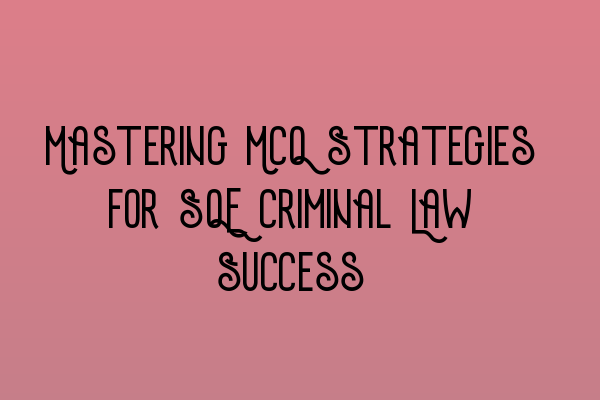Mastering MCQ Strategies for SQE Criminal Law Success
Are you preparing for the Solicitors Qualifying Examination (SQE) Criminal Law assessment? Are you looking for effective strategies to tackle multiple-choice questions (MCQs) and achieve success? Well, you’ve landed on the right page!
At SQE Criminal Law & Practice Law UK, we understand the importance of MCQs in the SQE assessment process. These questions assess your knowledge and understanding of key principles, rules, and concepts in Criminal Law. By employing the right strategies, you can improve your performance and boost your chances of securing a high score.
In this blog post, we will guide you through some tried and tested MCQ strategies that will help you master the SQE Criminal Law assessment. So, let’s dive in!
1. Understand the Question Format:
Familiarize yourself with the structure and format of MCQs in the SQE Criminal Law assessment. Each question will have a stem, options, and a correct answer. Pay close attention to keywords and phrases that indicate what the question is asking for.
2. Read the Question Carefully:
Read the question carefully, making sure to understand the context and what is being asked. Identify the key elements and essential information provided in the stem.
3. Analyze the Options:
Go through each option and carefully weigh their relevance to the question stem. Eliminate options that are clearly incorrect. Remember, there is only one correct answer, so choose the option that best aligns with the question requirements.
4. Use Process of Elimination:
If you are unsure about the correct answer, use the process of elimination. Cross out options that are clearly incorrect, reducing your choices and increasing your chances of selecting the correct answer. This strategy can be particularly helpful when you are stuck between two options.
5. Be Mindful of Absolute Statements:
Be cautious of options that include absolute statements such as “always,” “never,” or “all.” These statements are often incorrect, as exceptions and nuances exist in the field of Criminal Law. Look out for qualifiers like “usually,” “often,” or “rarely,” as they are often indicators of more accurate options.
6. Pay Attention to Legal Terminology:
Criminal Law is filled with legal terminology and precise definitions. Pay close attention to these terms and ensure you fully understand their meaning and application. MCQs often test your knowledge of legal concepts, so being well-versed in the terminology will greatly benefit your performance.
7. Practice Time Management:
Time management is crucial when tackling MCQs. In the SQE Criminal Law assessment, you will have a limited amount of time to answer a specific number of questions. Make sure you allocate your time wisely, answering each question within the given time frame. If you get stuck on a particularly difficult question, move on and come back to it later if time permits.
8. Mock Tests and Practice Questions:
Utilize mock tests and practice questions to familiarize yourself with the MCQ format and refine your skills. SQE Criminal Law & Practice Law UK offers a range of practice materials designed to simulate the actual assessment. Practicing under exam-like conditions will enhance your confidence and improve your performance on the day of the assessment.
Now that you are armed with these valuable strategies, it’s time to put them into practice. Remember, mastering MCQs requires both knowledge and skill. Study diligently, apply these strategies, and keep a calm and focused mindset during the assessment.
At SQE Criminal Law & Practice Law UK, we are dedicated to helping aspiring solicitors succeed in their SQE Criminal Law assessment. With our comprehensive resources and expert guidance, you can confidently approach the MCQ section and achieve the results you desire.
Get in touch with us today to take your SQE Criminal Law preparation to the next level. Together, let’s unlock your full potential and pave the way for a successful legal career!
Disclaimer: This blog post is meant for informational purposes only and should not be considered legal advice. Always consult with a qualified solicitor for specific legal guidance related to your situation.
